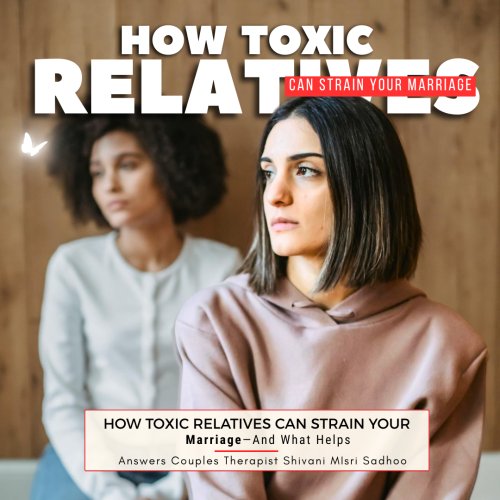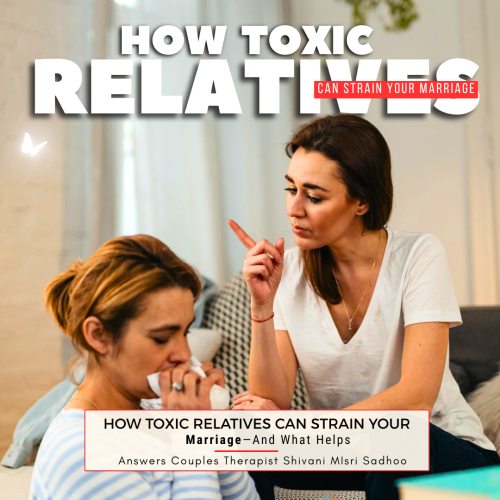Marriage is more than the bond between two people; it is influenced by families, culture, and social circles. While supportive relatives can strengthen a marriage, toxic relatives—those who overstep boundaries, criticise, or manipulate—can create tension and conflict. These influences can affect communication, trust, and intimacy, putting stress on even the strongest partnerships.
Understanding the ways toxic relatives impact a marriage, and the strategies that help mitigate their influence, is essential for maintaining harmony and resilience. Explains Shivani Misri Sadhoo, a leading marriage and family therapist and famous marriage counsellor in Delhi and India.

How do toxic relatives affect a marriage?
Toxic relatives can have a subtle but profound impact on a couple’s relationship. They often interfere in decisions, criticise one spouse, or manipulate family dynamics, causing stress and tension. Their behaviour can erode trust and make partners feel unsupported or isolated. Repeated exposure to these patterns can lead to emotional fatigue, resentment, and distance in the marriage.
Constant Interference
When relatives offer unsolicited advice or question decisions about finances, parenting, or personal choices, it can spark disagreements between spouses. This interference often leaves couples frustrated and feeling pressured to defend their choices.
Eroding Boundaries
Relatives who overstep limits—showing up uninvited, criticising a spouse, or trying to control decisions—can create tension and resentment. When boundaries are not respected, it can leave one partner feeling unsupported or undervalued.
Emotional Stress
Persistent criticism, manipulation, or conflict with relatives can cause anxiety, exhaustion, and emotional strain. This stress affects communication and intimacy, making it harder for partners to connect or resolve disagreements calmly.
Undermining Trust
When one partner feels left to handle difficult relatives alone, it can erode trust and emotional security. This makes the couple more vulnerable to misunderstandings and internal conflicts.

What strategies help—and how do they help?
Addressing toxic relatives effectively requires thoughtful strategies that protect the marriage while maintaining necessary family relationships. Implementing these strategies strengthens trust, communication, and emotional connection between spouses.
Setting Clear Boundaries
Discussing and agreeing on what behavior is acceptable from relatives helps reduce conflict. Clear boundaries protect the couple from interference and reassure each partner that their perspectives are valued.
Staying United as a Couple
Presenting a consistent front when dealing with family shows relatives that the couple is a team. This unity prevents manipulation and reinforces trust, making the marriage more resilient to external pressures.
Open Communication
Sharing feelings honestly and discussing how relatives’ behavior affects the relationship prevents resentment. Open dialogue ensures that both partners feel supported and enables joint strategies for handling difficult situations.
Limiting Exposure
Reducing interactions with particularly toxic relatives or controlling the time spent with them provides emotional relief. Limiting exposure allows couples to focus on their relationship and restore harmony.
Seeking External Support
Counseling or support groups offer guidance on managing family dynamics effectively. External support helps couples develop practical coping strategies, improving communication and reducing stress.
Conclusion
Toxic relatives can quietly create stress, conflict, and emotional distance in a marriage. However, couples who recognise the impact of these behaviours and implement strategies such as setting boundaries, staying united, communicating openly, limiting exposure, and seeking external support can protect and strengthen their relationship. These approaches help reduce conflict, reinforce trust, and foster intimacy, allowing marriages to thrive even amid challenging family dynamics. By prioritising the marital bond and addressing external pressures thoughtfully, couples can maintain a strong, resilient partnership.
Check out the Video on How to Cut Toxic Family Ties

Shivani Misri Sadhoo is an internationally recommended relationship counsellor by the world’s biggest and most trusted study and research-based foundation for couples therapy – Gottman Institute. She is trained in specialised key relationship counselling Skills from AIIMS, VIMHANS and various other reputed institutions. Counsellor Shivani Misri Sadhoo is also certified in emotionally focused therapy, cognitive behavioural therapy, and dialectical behaviour therapy.
Counselor Shivani Misri Sadhoo is also a Certified Neuro Linguistic Practitioner with specialized training and experience in the field of affairs/betrayals, trust issues, difficulty communicating, conflicting values, bereavement, grief and loss (affairs, separation, divorce, childhood) and emotional health issue (anxiety, social anxiety, fear, depression, low mood).
Currently, Shivani Misri Sadhoo is one of the top counselors with the HIGHEST Success Rate with over 17,000 happy couples and individuals (based in India and abroad), who has benefited from her therapy. Psychologist and Counselor Shivani Misri Sadhoo not only practices independently from her clinic in Greater Kailash, Delhi, India, but also is listed on the panel of eminent hospitals like IBS Hospital Panel – Institute of Brain and Spine, Express Clinic, Fortis (formerly) based in Delhi.
Call Counselor: +91-8860875040
Email: saarthiforlife@gmail.com



